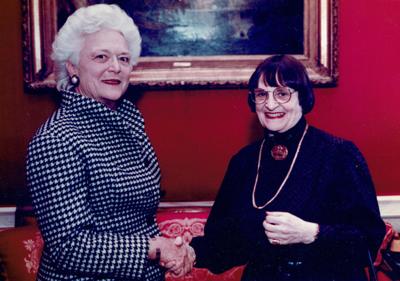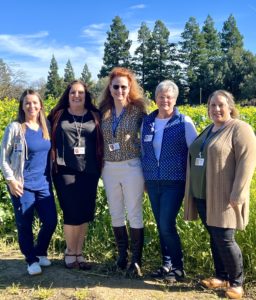Without women, there is no god (or healthcare)
By: Craig Dresang, CEO, YoloCares
Maude LaMontagne-Fellner, an early 20th century activist with the Women’s Suffrage Movement, became the first licensed female insurance agent in the country. I wish I could have known her because she was also my great grandmother.
Not long after she received a license to sell insurance, her home state of Wisconsin led the country in ratifying the Nineteenth Amendment, granting women the right to vote.
The circle of women on my mom’s side of the family were widely known for their quick wit, silver tongue, and their ability to get stuff done. They were intelligent, clever, and had minds that could access and process information rapidly . . . characteristics that made them charming, wise, and often hilarious.
They were also a persuasive bunch. Family members often joked that any one of them could sell water to a drowning man or a lighter to the devil. I remember one conversation around our dining room table when my mom, her sisters, and their mom (who were all raised Catholic) were debating the legitimacy and value of religion. During a brief pause in the conversation, my mom leaned in toward the center of the table, took a long, long drag off of her L&M cigarette and with a slow sip of wine said, “Just remember, it was a woman who gave birth to God. If it wasn’t for women, the son of God wouldn’t exist.”
Everyone laughed, but I never knew if the comment was said in jest or if there was something more behind her words. I so often wish she was here so that I could ask her.
From my earliest days, I witnessed how much more balanced, thoughtful, and interesting life could be by having women at the center of it. Decades of studies have now shown that women leaders help increase productivity, enhance collaboration, inspire organizational dedication, and improve fairness. When more women are empowered to lead, everyone benefits. Nowhere has this been more true than in healthcare.
It was a woman by the name of Dame Cicely Saunders who founded the modern hospice movement in the mid-1900s. At the start of her career, she cared for terminally ill patients in England. It was there that she came to believe patients who were near the end of their lives needed a different type of health care. As a result, she dedicated her life to becoming a nurse, social worker and then a physician so that she could design a model of care that was patient-centered instead of illness- or disease-centered. That meant reimagining traditional healthcare and creating an approach that was respectful of and responsive to the individual’s preferences, needs, and values.

In 1963, Saunders gave a guest lecture at Yale University, discussing specialized care for the dying. Not long after, hospice care slowly began taking root in the United States. Then, another woman by the name of Dr. Elisabeth Kubler-Ross released her book titled “On Death and Dying” in 1969. It became a bestseller and made Kubler-Ross an internationally renowned author. Her work highlighted the “five psychological stages of dying” and Saunders’ new revolutionary way of dealing with dying patients. This work caught the interest of a young Madalon Amenta who is now a resident of University Retirement Community in Davis and member of the YoloCares Board of Directors.
Amenta’s life — past, present and future — represents purpose, accomplishment and an eagerness to shape the world around her. Not everyone can at once stake a claim as poet, nurse, researcher, author, lobbyist, mother, academician, national leader, pioneering entrepreneur and YoloCares board member. But Amenta, a lover of life, is all of these things and more.
Not too many decades ago, quality standards for hospice care did not exist. Clinicians had no national standards and no official guidelines to follow. Frustrated by this reality, Virginia Shubert who was a nurse and executive of Yolo Hospice, along with three other California women/nurses, locked arms to work on what would become the country’s first set of quality assurance manuals.
When they were finished cobbling together guides that could be used by hospice nurses everywhere, they handed their work over to Amenta, the first president of the Hospice & Palliative Care Nurses Association, which certifies nurses in the field. Amenta took the work of these four nurses and spread it out on her dining room table where she spent the next six weeks pulling together “Quality Assurance for Hospice Patient Care.” First published in 1988, the manual served as the go-to standard for hospice nurses. Each page represented a framework that is still used by hospice professionals today.
Chuckling, Amenta says, “We sold it for $25 a copy. As an organization, we had no money in the early days. Our only source of income came from charging $35 for membership fees and there were fewer than 100 members.” Now, nearly 12,000 members belong to the association.
“From my first nursing student days I felt that the American health-care system, for all its wonders of technology, failed patients as people,” according to Amenta. “It didn’t deal with the meaning of illness or the consequences of treatment. It needed to be reformed. Caring as well as curing needed to become institutionalized.”
Her earliest inclinations were artistic. In her youth, she fancied herself an actor, poet and writer. However, “My forays into those fields never even began to pay the bills, so I decided to become a nurse,” she says. Years later, out of a deep engagement of working on the book, “Nursing Care for the Terminally Ill,” she concluded that the essence of hospice care is found in a spiritual dimension, the source of love and caring.
“According to St. John, ‘work is love,’ and according to Khalil Gibran, ‘work is love made visible,’ and according to me, hospice work is love made operational,” Amenta says. As an early American voice in the hospice movement, Amenta served as a founder of both the national Hospice & Palliative Nurses Association and the Pennsylvania Hospice Network. She also was the director of education and research at Forbes Hospice, and later co-authored “Nursing Care of the Terminally Ill,” the first American textbook on hospice care.

Today, women health care workers are the backbone and heartbeat of strong health systems. Women represent 75 percent of the workforce in hospitals and 77 percent of total employment in health services, but only 25 percent of leadership roles in healthcare.
By contrast, YoloCares has a five-decade history of supporting women at the most senior levels of leadership. Six, out of nine, members of the YoloCares senior leadership team, including the chief financial officer (CFO), are women. Ten out of 12 members of the board of directors are also women. During Women’s History Month, YoloCares celebrates the contributions women have made in the lives of those who are suffering or in need. The agency also reaffirms its commitment to advancing rights and opportunities for women who have courageously fought for equality, justice, and opportunity. It is the organization’s hope that the trailblazer spirit that has guided the course of American history will continue to shape its future.






Leave a Reply